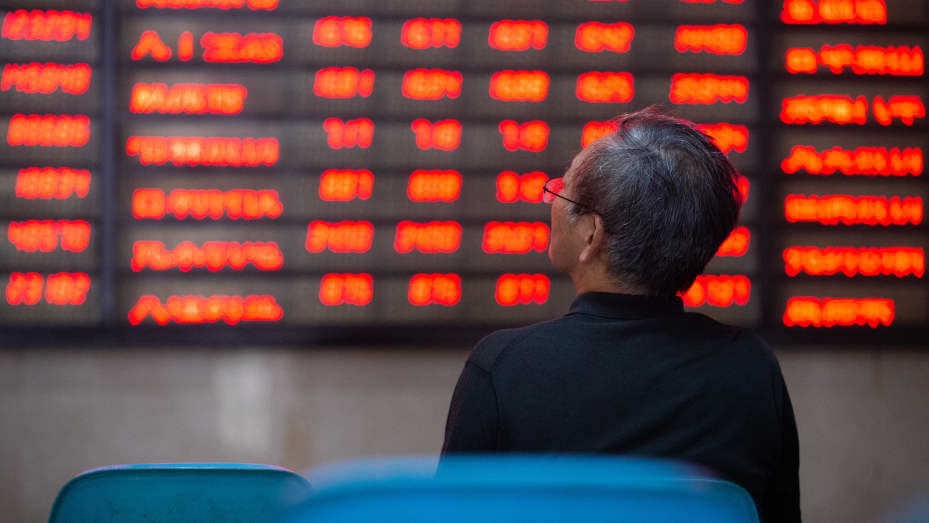D-Street Surge Boosts Influence On MSCI Gauge, Signalling India’s Ascension And China’s Challenges
As the world grapples with shifting surges in the investment and economic markets, 2023 stands out as a year marked by contrasting fortunes for India and China. In this scenario, India has not only secured its position as a magnet for Foreign Portfolio Investment (FPI) but has also set a record with an inflow of $14.4 billion. Meanwhile, China faces significant headwinds, witnessing a staggering $955 billion loss in market capitalization across key exchanges. Hence, what are the factors behind India's surge and the challenges haunting Chinese stocks?

The surge in India’s influence on a significant MSCI global gauge has reached unparalleled levels, reflecting the remarkable rise of broad risk asset indices.
Mumbai’s weightage on the index now stands at a record high, surpassed only by Shanghai, solidifying its position as a crucial benchmark for global investors allocating funds to emerging-market equities.
With the addition of nine stocks on Friday, India’s representation on the MSCI’s Global Standard (Emerging Markets) index has reached 16.27%, surpassing the previous record set in October 2022 at 16.21%. In the previous month, India overtook Taiwan to regain the second position, with China currently holding the highest weightage at 28%.
India’s weight remained stable at around 8% from 2015 until October 2020; however, since November 2020, its weight in the highly monitored EM index has doubled, while China’s weight has declined from 43.2% to the current 28%.
) Analysts attribute India’s significant ascent in the MSCI EM index to various factors, including the standardized foreign ownership limit (FOL) in 2020, robust performance in Indian equities, and the relative underperformance of other EM markets, particularly China.
Analysts attribute India’s significant ascent in the MSCI EM index to various factors, including the standardized foreign ownership limit (FOL) in 2020, robust performance in Indian equities, and the relative underperformance of other EM markets, particularly China.
In 2023, Indian markets have demonstrated strong outperformance. MSCI India has recorded a noteworthy year-to-date surge of 12.3%, surpassing the modest 2.7% gain observed in MSCI Emerging Markets (EM).
The impressive performance has led to the inclusion of numerous Indian stocks in the MSCI EM index; additionally, MSCI’s recent transition to a quarterly rebalancing schedule for stock inclusions and exclusions has played a role in this shift.
This year, the number of Indian stocks included in the MSCI Standard index has increased to 131, reflecting the addition of 17 stocks over the past four reviews, compared to nine stocks added in 2022.
Despite the fact that foreign portfolio investors (FPIs) sold equities worth ₹1.26 lakh crore in 2022, they have invested ₹1.18 lakh crore in Indian shares so far in 2023.
According to Abhilash Pagaria, head of Nuvama Alternative & Quantitative Research, analysts anticipate that with consistent flows from domestic institutions and revived FPI participation, India could potentially surpass a 20% weighting in the MSCI EM Index by early 2024.
In 2019, the Indian government decided to elevate the statutory FPI limit for Indian companies to align with the sectoral foreign investment limit; the adjustment came into effect on April 1, 2020, offering companies the option to cap FPI limits at a lower threshold with board approval.

India’s Highs And China’s Lows
The year 2023 has proven to be a challenging period for market forecasters, particularly concerning Chinese stocks.
The slump in these stocks, resulting in a staggering $955 billion loss in market capitalization across exchanges in Hong Kong, Shanghai, Shenzhen, and New York, has posed significant challenges for bullish money managers.
Notable companies like Alibaba Group, Meituan, JD.com, and Ping An Insurance have experienced declines ranging from 10% to 52% in Hong Kong, contributing to a 9% drop in the MSCI China Index, ranking among the worst global benchmark indices.
Factors Playing Topsy Turvy
The root cause of this downturn lies in a miscalculation of China’s post-Covid economic recovery and the effectiveness of Beijing’s policy responses.
China’s incremental fiscal and monetary policies fell short of expectations, and crises at China Evergrande and Country Garden eroded investor confidence. At the same time, the yuan’s decline to a 16-year low has impacted returns and is expected to continue, limiting anticipated gains, according to analysts.
Jason Hsu, founder and chairman of Rayliant Global Advisors, noted the difficulty in promoting China exposure this year due to client apprehension fueled by negative headlines.
The fear is evident in the record capital flight from China, with foreign investors selling over 170 billion yuan ($23.4 billion) worth of onshore stocks since end-July. The ownership of Hong Kong-listed stocks dropped to 37% by September from approximately 44% in early 2020, as reported by Daiwa Capital Markets.
Major fund managers, including BlackRock and Bridgewater Associates, have shifted away from a bullish stance on the near-term outlook – the MSCI China Index has declined almost 10% in 2023, following drops of 23.6% in 2022 and 22.8% in 2021.
According to Bloomberg data, the Hang Seng Index is poised for a fourth consecutive year of setback, an unprecedented trend since its inception in 1969, unless a substantial rally occurs in Hong Kong.

China’s financial landscape has undergone a dramatic transformation over the past 11 months, as analysts at Goldman Sachs, who had initially set optimistic targets for the MSCI China Index, took a step back on November 12, downgrading their rating on offshore Chinese stocks to market-weight.
This shift reflects a broader trend as Goldman pivots towards favouring onshore-listed stocks, perceived as better insulated against liquidity and geopolitical risks.
The drastic change in sentiment on Chinese stocks contrasts sharply with the prevailing narrative just 11 months ago when these stocks were hailed as the world’s best to own.
Beijing’s departure from its zero-Covid policy received widespread acclaim and upgrades, setting a positive tone for the equity market.
At the beginning of the year, major financial institutions, including Morgan Stanley and JPMorgan, expressed bullish sentiments, anticipating a stellar performance for Chinese stocks in 2023.
However, the reality has been starkly different; despite an impressive start with the biggest rally in over two decades, Chinese equities faced headwinds as growth stumbled, exports slumped, and the yuan depreciated.
The Hang Seng Index in Hong Kong experienced a nearly 12% retreat, ranking as the worst among major global stock indices, while the Shanghai Composite Index surrendered all its gains.
In contrast, equities in Japan and India thrived, attracting a combined $38 billion of inflows this year, while China’s intake dwindled to $11 billion from a peak of $30 billion and emerging markets, excluding China, emerged as a popular investment choice.
)
The Viewpoint
Fundamentally, investors are reevaluating their stance on China, considering factors beyond valuation and growth – Geopolitical concerns and a desire to explore alternative options have influenced this shift, prompting some to look beyond China for investment opportunities and the dynamics shaping China’s equity market are proving to be more complex and unpredictable than initially anticipated.
The primary concern, according to Wang from UOB, revolves around a confidence issue. “It’s not about being pessimistic, but rather suggesting that everyone should exercise caution.”
In response, policymakers in Beijing are taking action.
The nation’s $1.35 trillion sovereign wealth fund, through its Central Huijin Investment unit, has increased its stake in the nation’s leading banks and certain exchange-traded funds to restore investor confidence, and other state-run entities have also intervened, with a state asset regulator publicly endorsing home builder China Vanke.
As of late, stocks in the MSCI China Index are trading at 11.8 times their forward 12-month earnings, notably lower than the five-year average multiple of 14.8 times, as per Bloomberg data.
The reduced valuation has caught the attention of fund managers like Franklin Templeton, managing assets worth $1.33 trillion. Tariq Ahmad, Head of Asia-Pacific at Templeton, expressed enthusiasm about the valuation, stating that the current affordability presents favorable entry points for long-term growth strategies.

Despite relentless headlines about “Peak China” and skepticism surrounding the China story, some investors believe the market is oversold.
Terrence Gray, a portfolio manager at Lazard Asset Management, notes that China appears compelling, especially when compared to India’s nearly three times higher average emerging markets price-to-earnings ratio.
Optimism is buoyed by the recent in-person meeting between President Xi Jinping and Joe Biden, sparking hope that tensions in the US-China rivalry may ease, making foreign funds more open to Chinese stocks.
However, reasons persist for China bears to remain cautious.
The stability of the yuan seems precarious, and a potential hike in domestic interbank offered rates may not be sustainable, given the damage to credit demand. Investors are sceptical that authorities would sacrifice recovery to maintain a stable currency.
Similarly, concerns about private property developers are contributing to the spotlight on bond defaults; liquidity issues, worsened by Beijing’s “three red lines” policy, continue to echo, with China Evergrande facing a winding-up ultimatum in a Hong Kong court on December 4.
Hence, according to Bank of America, even domestic investors are exhibiting hesitancy – earnings downgrades have outpaced upgrades by about four to one among companies traded in Shanghai and Shenzhen.
Popular funds, like the $6.8 billion Blue Chip Select managed by E Fund Management, have witnessed redemptions by retail investors for three consecutive quarters, shrinking its net assets by more than 15% this year.
Chinese stocks’ low valuations may be attributed to structural declines in the profitability of listed companies, particularly internet firms facing regulatory constraints.
According to BCA Research, hurdles to a sustainable recovery in China’s equity market remain high, with macro pressures on earnings, currency weakness, and broader economic challenges.
The Last Bit, without more decisive policy measures and a significant cyclical upturn, Chinese stocks are likely to remain highly volatile despite their deeply depressed valuations, according to analysts at Alpine Macro.
Hence, rebuilding confidence in the market will require considerable time, stressing the challenging road ahead for Chinese equities.




